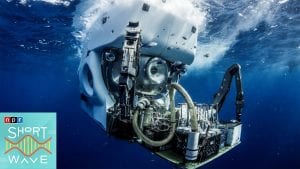WHOI in the News
The Gulf Stream Is Weakening and It Promises Stronger Storms For NY And NJ
The oceanic network matters because it has an outsized influence on making the world habitable, said Peter de Menocal, the president and director at Woods Hole Oceanographic Institution.
A Gruesome Feeding Frenzy in the Atlantic Ocean
Even when a whale dies an unnatural death, its body joins the ocean’s vast circle of life. And very often, that circle is very messy, and it involves sharks. WHOI’s Dr. Michael Moore speaks with The Atlantic about a feeding frenzy in the Atlantic Ocean.
First description of deep benthic habitats and communities of oceanic islands and seamounts of the Nazca Desventuradas Marine Park, Chile
A Quick Dive Into How Submarines Work
Submarines can descend thousands of feet below the surface of the ocean, but to do so, they have to deal with an enormous amount of pressure. NPR caught up with WHOI’s Bruce Strickrott, Group Manager and Chief Pilot of the Deep Submergence Vehicle Alvin, who explains some of the fundamental engineering principles that allow submarines to dive so deep without imploding under the pressure, and shares updates on Alvin’s overhaul and future dives.
Human Occupied Vehicle (HOV) Alvin is part of the National Deep Submergence Facility (NDSF). Alvin is one of the most recognized deep submergence vessels in the world and the only one in the U.S. capable of carrying humans into extreme ocean depths. The sub has completed 5,065 successful dives, more than all other submersible programs worldwide combined. When Alvin relaunches next fall, the iconic sub will have the ability to dive to 6500 meters (21,325 feet)—almost 4 miles deep and 2,000 meters deeper than Alvin’s current maximum depth of 4500 meters (14,800 feet). The upgrade will also give the sub access to 99% of the ocean floor.
Deep Sea Science: Deep Sea Reveals Insights On Human
Scientists have discovered bacteria from the deep sea with components that are unrecognizable by the human immune system and may hold important properties in the development of cancer treatments and vaccines, according to a collaborative study published in Science Immunology.
UAF’s Seward Marine Center celebrates a half-century of supporting marine research
Street Name Change Coming To WHOI Campus
According to WHOI, the Falmouth planning board approved the name change of a street that winds through its campus…from Maury Lane to Marie Tharp Lane.
When ‘Eradicated’ Species Bounce Back With A Vengeance
Some invasive species targeted for total eradication bounce back with a vengeance.
Changing climate: In-depth coverage of our changing climate and environmental issues
Woods Hole renames street for female oceanographer Marie Tharp
10 Years After Japan’s Fukushima Daiichi Meltdown, I’m Still Worried | Opinion
It’s been encouraging to watch the marine life rebound without the pressure of local fisheries.
Cape Ann Climate Coalition to hold virtual celebration of life of Elaine Starrett
Following the screening, Starrett’s daughter, Dr. Amy Bower, an oceanographer at the Woods Hole Oceanographic Institution, will be joined in conversation by Cape Ann environmental 3-D artist Sinikka Nogelo and the nationally-known public artist Mags Harries.
A decade after Fukushima nuclear disaster, contaminated water symbolizes Japan’s struggles
Running out of space to build more tanks, the government wants to gradually release the water into the sea – after it has been decontaminated and diluted – over the next three decades or more.
#VeteranOfTheDay Navy Veteran Wendy B. Lawrence
As a U.S. Navy officer and NASA astronaut, Wendy B. Lawrence spent over 20 years of her life serving her country both on planet Earth and in outer space.
Fewer than 366 North Atlantic Right whales are left on earth
“North Atlantic right whales face a serious risk of extinction, but there is hope if we can work together on solutions. Trauma reduction measures and applying new tools to assess their health are critically important to enhance the welfare of individual whales. If we can reduce the number of deaths, and successfully improve their health (and increase their) reproduction, the current decline in population can be reversed,” says lead study author Michael Moore, a whale trauma specialist at Woods Hole Oceanographic Institution.
INCOIS to go for airline mapping of ocean floor
The Indian National Centre for Ocean Information Services (INCOIS) is planning to take the help of the National Remote Sensing Centre (NRSC) for airline mapping of Andaman and Nicobar Islands and Lakshwadeep to get a better picture of the ocean floor, also called ‘bathymetric’ study.
Coast Guard Cutter Polar Star completes 12-week deployment in Bering Strait region
The U.S. Coast Guard’s sole heavy icebreaker, Polar Star, recently broke the nation’s 40-year winter absence from icy waters above the Arctic Circle while on a 12-week deployment to the Bering Strait region.
Follow the smell of the ocean to find where marine predators feed
‘Ropeless’ Lobster Fishing Could Save The Whales. Could It Kill The Industry?
Some open ocean waters teeming with an abundance of life
Since Charles Darwin’s day, the abundance of life on coral reefs has been puzzling, given that most oceanic surface waters in the tropics are low in nutrients and unproductive.
Seattle-based Coast Guard icebreaker returns home after first mission in nearly 40 years to wintertime Arctic
Study reveals energy sources supporting coral reef predators
The scientists believe that this offshore energy may be entering the food web through lower-level plankton feeding fish that the groupers are then feeding on. This is likely to be supported by inputs of nutrient-rich deep water, which are little understood.



